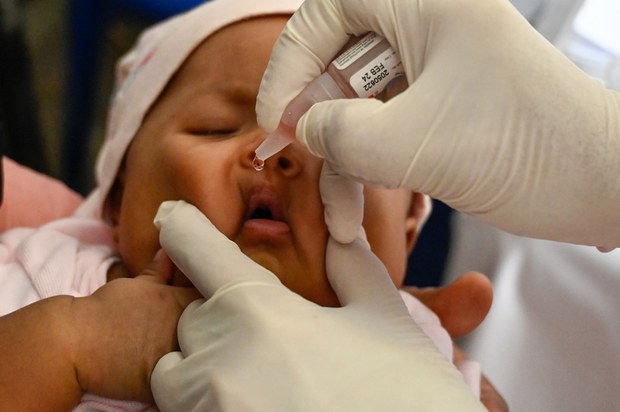Indonesia’s polio vaccination drive in Aceh faces hurdles amid outbreak
2022.11.29
Jakarta
 A baby receives a polio vaccination dose at an integrated services post in Banda Aceh, Nov. 14, 2022.
A baby receives a polio vaccination dose at an integrated services post in Banda Aceh, Nov. 14, 2022.
Indonesia has kicked off a polio vaccination campaign in Aceh after several cases were discovered there, but some parents won’t let their children receive doses for religious reasons and because they fear adverse effects, officials said Tuesday.
Polio was considered eliminated in the country in 2014, but the virus was detected last month in an unvaccinated boy in the province, where only about half of all infants received a dose of vaccine last year.
On the first day of the campaign on Monday targeting children to age 12 in Pidie regency, some parents were opposed to their children being inoculated against the potentially crippling disease.
“About 15 percent rejected, mostly in schools,” said Arika Husnayanti, the head of the health department in Pidie, adding that 14,000 children received the doses on the first day.
“If there is resistance, we will inform the head of the clinic to suspend vaccinations. Later the local police chief and the district chief will come and approach the village head. Then our team will return,” she said.
The government plans to have administered the type-2 poliovirus vaccine to 1.2 million children in Aceh by January.
“The target for coverage is 95 percent at each stage,” said Prima Yosephine, acting director of immunization at the Ministry of Health.
The ministry declared an extraordinary event after a polio case was discovered in Pidie on Oct. 2, eight years after the World Health Organization (WHO) declared that Indonesia had eradicated the virus.
A 7-year-old boy who had not been vaccinated was paralyzed in the left leg.
So far, officials have recorded four cases – all in Aceh – with three of them categorized as type-2 polio with no paralysis.
An Acehnese man who declined to be named for privacy reasons said he did not vaccinate his 4-year-old child.
“They said it contained non-halal ingredients, so I didn’t allow the vaccine,” the 30-year-old man told BenarNews.
But he said he would have his child vaccinated now that there was an outbreak in Aceh.
“If I had a choice, I wouldn’t.”
Of all provinces in Indonesia, Aceh has the lowest coverage of childhood immunization, at 38.4 percent in 2021. Coverage was at nearly 60 percent in 2017 but has continued to decline since.
Aceh is a religiously conservative province, the only one in Muslim-majority Indonesia allowed to implement Sharia law.
Polio vaccination coverage in Aceh was at 50.9 percent in 2021, compared with 80.7 percent nationally.
A survey conducted by the health ministry after the outbreak revealed that parents decided to not vaccinate their children because of fears of adverse effects, religious beliefs or a lack of knowledge about the benefits of vaccination.
The COVID-19 pandemic also disrupted childhood and adolescent vaccination programs, the health ministry said.
Polio is caused by a virus that attacks the nervous system and can cause permanent paralysis. The virus is transmitted through feces and grows in the digestive tract.
Wild poliovirus cases have decreased by more than 99 percent since 1988, from an estimated 350,000 cases in more than 125 endemic countries then, to six reported cases in 2021, according to the World Health Organization.
Currently, endemic transmission of wild poliovirus continues in areas of Afghanistan and Pakistan, WHO said. According to the U.N. agency’s Global Polio Eradication Initiative, new poliovirus cases were found last week in Afghanistan, Algeria, Chad, the Democratic Republic of Congo, Ethiopia and Nigeria.
Failure to stop polio in any remaining areas could result in a global resurgence of the disease, WHO warned.
“That is why it is critical to ensure polio is eradicated completely, once and for all,” it said.
‘Really stop the transmission’
Dicky Budiman, an epidemiologist at Griffith University in Australia, said opposition to vaccination among some people could make the goal of eradicating police harder to achieve.
“Polio can cause infected people to experience paralysis and even death. Even for cases whose only symptoms are fatigue and muscle weakness, there’s risk for the post-polio syndrome which can cause paralysis at adulthood,” Dicky told BenarNews.
Misinformation about vaccines is why parents are reluctant to vaccinate their children, he said.
“The government has failed to counter [misinformation] with a good risk management strategy. This cannot be allowed to continue,” he said.
Tjandra Yoga Aditama, a former WHO director of infectious diseases for Southeast Asia, said that Indonesia had an outbreak of 305 polio cases in 10 provinces between 2005 and 2006.
Maxi Rein Rondonuwu, director general of disease prevention and control at the health ministry, urged parents to support the polio vaccination program.
“This is to ensure we can really stop the transmission,” he told reporters on Tuesday.
Polio immunization has helped almost 20 million people walk today who would otherwise have been paralyzed, according to the WHO.







